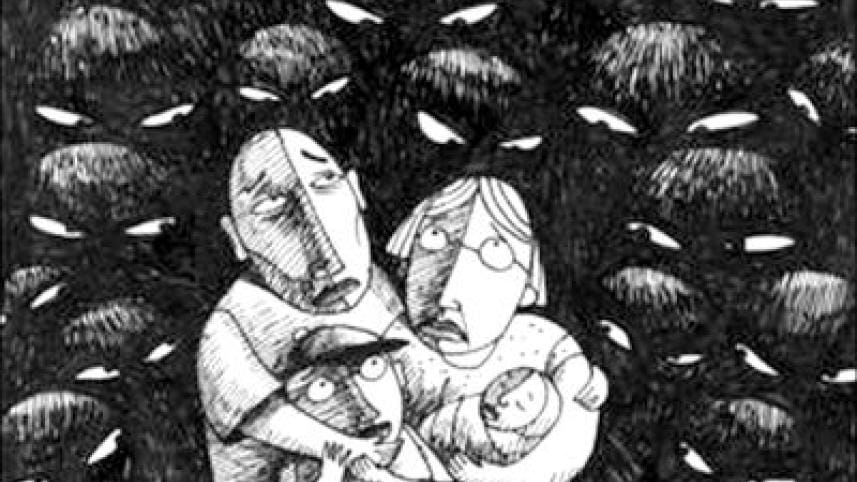The fuss about ISIS and what we need to do

The murders of bloggers, intellectuals, priests, academicians, rights activists, and also persons of ordinary vocations committed by allegedly extremist groups owing allegiance to ISIS have given rise to a heated controversy regarding the organisational existence of such an outfit in Bangladesh. Every time an incident even remotely carrying the hallmarks of religiously motivated extremist groups occurs, there is instant attribution by some western quarters to ISIS. The government, on the other hand, loses no time in firmly denying its existence in Bangladesh.
The denial mode about the organisational existence of ISIS gives rise to uneasiness. In the past, it was the persistent denial of the then establishment of there being any JMB or its Bangla Bhai and his depredations in northern areas of the country. The then authorities grappled with the reality only when the ground conditions and mounting international pressure compelled them to confront the religious extremists. As a result, extremist dens were busted, criminal cases were registered and finally capital punishment was handed down to at least six notorious terrorists.
One could reasonably ask as to what is significant in the continuous attribution to ISIS hands behind every suspected extremist attack. The government of the day, despite its denial of the organisational existence of ISIS, has commenced appropriate legal actions. That is only desirable because in the penal lexicon all the suspected extremist attacks constitute criminal offenses and as such statutory actions have to follow.
Are some quarters venturing to make us and the world at large believe that the Bangladeshi polity is prone to extremist ideas and that the bigoted elements can have a field day on account of slack governance? How does the admission of the organisational existence of an extra-territorial network help us in adequately confronting the menace? The blunt reality may be that misguided elements in our midst stand ready to carry out the implementation of ISIS objectives for their so-called religious beliefs. However, that cannot detract the resolve of the mainstream to confront such religious extremism.
ISIS would naturally prefer to work through secretive or banned organisations. Such organisations cannot operate openly and thus one may not be definitive about their organisational existence. In Bangladesh, banned organisations like JMB or HUJI or the relatively recent Ansarullah Bangla Team have suspected elements within its fold who are ready to work as foot soldiers of ISIS without any extra-territorial promptings.
The presence of operatives of international terrorist groups is not an essential precondition for terrorist occurrences within the country. Ideas of extremism to identification of targets can well be coordinated from distant lands. External connections of militants in Bangladesh cannot be viewed as an entirely new development. Given the history, effective links would require very little effort. Individual acquaintances may not take much time to turn into organisational ties. Therefore, denial of external connections should not be a strategy. It is time to act proactively.
What needs to be done is to note that the militant's focus is on the use of power in pursuit of policy. Some sections of the public have been converted to this approach. Incidentally, the liberal current of opinion was significantly de-legitimised. The goal, therefore, should be denial of space for the radicalised and the militant. The extremists shall not be allowed to develop vital stakes in the political system.
While eradicating or controlling militancy it should occur to us that in Bangladesh the advocates of the extreme path are more determined than the liberals. Liberal forces hardly work with intense dedication, much less with a sense of mission. One has to remember that in Bangladesh secularism as state ideology finds it difficult to compete with a language of belonging saturated with religion.
One has to recognise the socio-economic reality of Bangladesh where gross poverty co-exists with democracy, a liberal constitution and disorder with functioning polity; the religious and traditional beliefs are far more tenacious than the liberals imagine. The State has, at times, been involved in the business of defining religion. Significantly, the compulsions of the traditional obligations of the ruler to protect State religion have to be kept in view.
The militants' strategy consists of efforts to win the trust and confidence of the majority population based on the role of extremists serving as arbitrators of individual and community disputes and financiers of education and livelihoods. Therefore, specific economic issues should be addressed on an urgent basis.
The area of action to counter militancy is a battle of ideas, challenging the ideological motivations that extremists believe justify the use of violence. Successful prosecution in the courts, based on gathering of necessary evidence and apprehending those involved in planning acts of terrorism before committing of mischief should be one of the principal approaches of countering militant activity.
The inescapable fact is that the ultimate responsibility of breeding a violent culture and its multiple social ramifications shall fall on state agencies that fail to see the ominous signals of religious extremism and perhaps willy-nilly nurture and protect the so-called Jihadi groups.
There is a causal relationship between policy and violence on the social level within the country and on the personal level within the household. The state has to accept responsibility for the overall propensity for violence in the public and private places. Respect for religious difference, and racial, sexual and ethnic freedom needs to be recognised by the state first before it is recognised by everyone else.
The writer is a columnist of The Daily Star.




 For all latest news, follow The Daily Star's Google News channel.
For all latest news, follow The Daily Star's Google News channel.
Comments